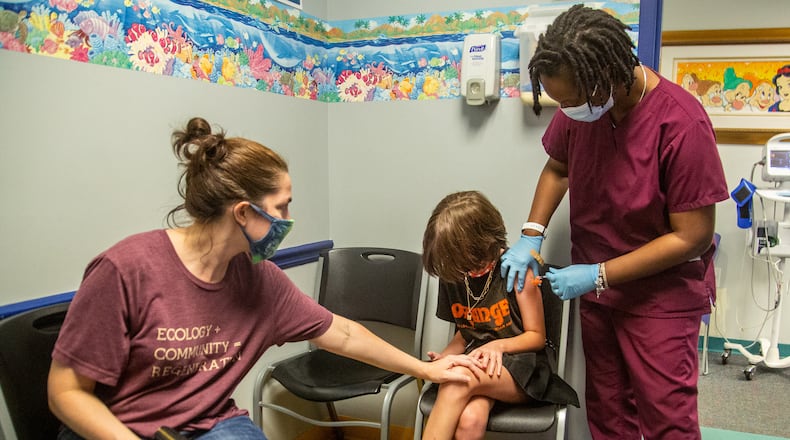The U.S. Food and Drug Administration’s announcement Tuesday that it will allow children ages 5 to 11 to get a COVID-19 vaccine booster, raises the question of how Georgia’s youth vaccination rate stacks up to the rest of the country.
Federal data shows that nearly 156,000 Georgia children in that age range have received two vaccines doses. That’s about 16% of the population of 5- to 11-year-olds in the state.
In comparison, the nationwide vaccination rate for that age range is nearly 29%.
In November, ages 5-11 became the youngest to be approved for COVID-19 vaccination, but parents did not race to get the shots. The age group has the lowest vaccination rate of any age group.
Georgia’s overall vaccination rate is 56%, and the rate for seniors — those 65 and older — is more than 83%. Georgia’s booster adoption rate is significantly lower, with only 41% of fully vaccinated people getting a booster dose.
Georgia’s vaccination rates rank among the lowest among states. Georgia ranks 45th in the U.S.
Omicron subvariants are beginning to gain traction and increase infections in Georgia. According to the most recent data from the state Department of Public Health, the seven-day moving average for confirmed infections was 839 cases on May 3, which is about double the infection rate from three weeks prior. Data after May 3 is preliminary, but it appears the uptick will continue, building to a predicted summer surge in the South that is typically seen as hotter weather drives more people indoors.
Studies have shown the boosters, recommended for five months after the initial vaccines are finished, can boost immunity in children 5-11.
Metro Atlanta’s largest school districts are all planning to provide in-person instruction for the fall semester. Some districts, like Clayton County, are offering virtual learning options for the families of students who request it.
Some individual classrooms are pivoting to virtual-only learning during periods of COVID-19 outbreaks. Atlanta Public Schools said two fourth-grade classes are online only “due to a significant number of positive cases and symptomatic individuals identified through the week, among students and staff.” Those classes shifted to online-only learning options Friday and plan to return to the physical classroom on Thursday.
Staff writer Vanessa McCray contributed to this story
About the Author
The Latest
Featured



